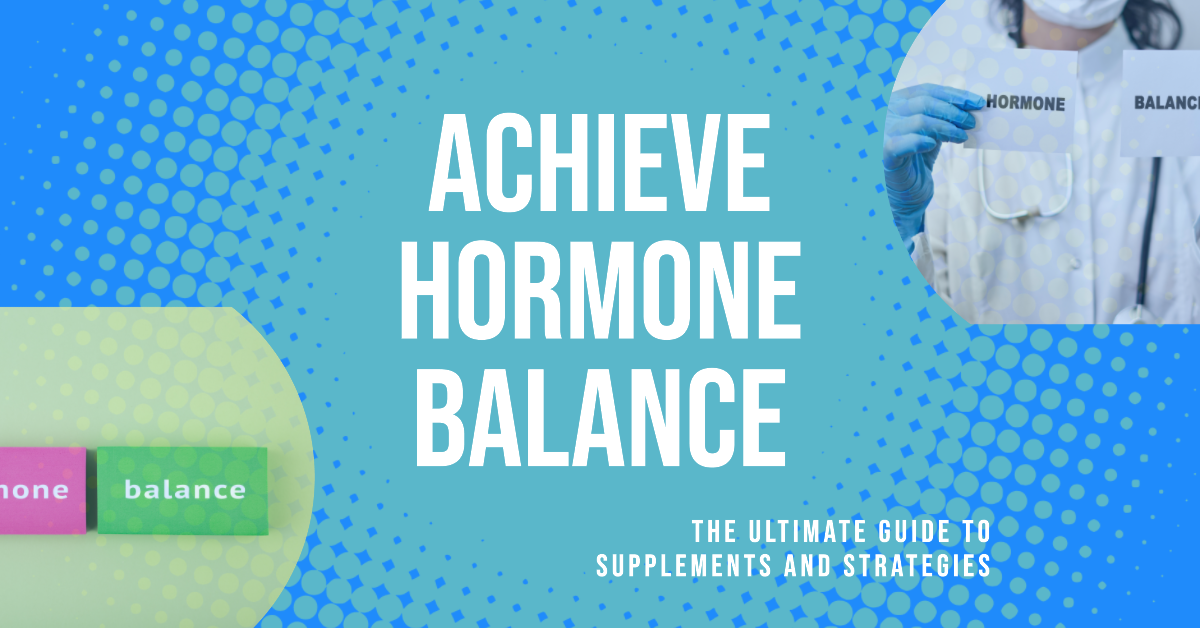Introduction
Every woman knows the feeling when her hormones are out of sync. It’s like an internal alarm that something isn’t right. Surprisingly, around 80% of women experience hormonal imbalances at some point in their lives.
Hormonal imbalances can manifest in myriad ways, affecting both physical and mental health. From dietary habits to the role of stress, understanding the underlying causes is the first step. Supplements, including Magnesium and Maca Root, offer natural solutions to regulate and balance these crucial body messengers
Hormone balance is crucial for overall well-being. In our ultimate guide, we explore the intricacies of hormones, their imbalances, and how supplements can play a pivotal role in restoring harmony.
While hormonal fluctuations are a natural part of a woman’s journey, they often go unnoticed until they start affecting health and well-being. The good news? Balancing hormones might be simpler than you think. With the right diet, essential vitamins, and targeted supplements, you can restore your hormonal harmony. Dive in to discover how.
Understanding Hormonal Imbalance
Hormones are the body’s internal messengers, instructing organs and tissues on their functions. With over 50 different hormones, our focus here is on two primary ones: estrogen and progesterone. An imbalance arises when there’s too much or too little of these hormones, often due to malfunctioning endocrine glands. This miscommunication can lead to a cascade of side effects, much like misunderstandings in a relationship.
Myo-Inositol & D-Chiro Inositol Blend Capsule: This product boasts a beneficial 40:1 ratio, which is crucial for hormone balance and healthy ovarian support. With the added benefit of Vitamin D3, it’s a comprehensive solution for women seeking natural hormonal support.

Photo: Amazon
Common Causes of Hormonal Imbalance
Hormonal imbalances can arise from various factors, including:
- Dietary habits
- Stress
- Exposure to environmental toxins
- Medical conditions like PCOS, diabetes, and thyroid disorders
Dietary Habits
What it means: Dietary habits refer to the patterns of eating, including what, when, and how often one consumes food and beverages.
Impact on Hormonal Balance: The food we consume plays a pivotal role in regulating our hormones. Consuming a diet high in processed foods, sugars, and unhealthy fats can lead to insulin resistance, increased estrogen production, and inflammation. On the other hand, a balanced diet rich in whole foods, fiber, and essential nutrients can support optimal hormone function.
To promote hormonal balance, prioritize a diet rich in whole grains, lean proteins, healthy fats (like avocados and nuts), and a variety of fruits and vegetables. Limiting caffeine, alcohol, and sugar can also help in maintaining a hormonal equilibrium.
Stress
What it means: Stress is a natural response of the body to challenging situations, whether they are real or perceived. It can be acute (short-term) or chronic (long-term).
Impact on Hormonal Balance: Chronic stress leads to prolonged cortisol release, the primary stress hormone. Elevated cortisol levels can disrupt sleep, appetite, metabolism, and reproductive health. It can also lead to conditions like adrenal fatigue, where the adrenal glands cannot produce adequate hormones.
Managing stress is crucial for hormonal health. Techniques like meditation, deep breathing exercises, regular physical activity, and adequate sleep can help in mitigating the effects of stress.
Exposure to Environmental Toxins
What it means: Environmental toxins are harmful chemicals present in our surroundings, which can be in the air we breathe, the food we eat, or the products we use.
Impact on Hormonal Balance: Many environmental toxins, such as BPA (found in some plastics), pesticides, and certain industrial chemicals, act as endocrine disruptors. They mimic natural hormones, blocking or altering their functions and leading to imbalances.
Reduce exposure by opting for organic produce, using natural personal care and household products, and avoiding plastics, especially for food storage. Regular detoxification practices, like consuming antioxidant-rich foods and staying hydrated, can also help in eliminating these toxins from the body.
NewLife Naturals Diindolylmethane DIM Supplement: A potent 300mg DIM combined with BioPerine, this supplement aids in estrogen metabolism. It’s an excellent choice for those seeking relief from PCOS, acne, or menopausal symptoms.

Photo: Amazon
Medical Conditions: PCOS, Diabetes, and Thyroid Disorders
What it means: These are specific health conditions that directly impact hormonal health.
- PCOS (Polycystic Ovary Syndrome): A common condition where small cysts form on the ovaries, leading to hormonal imbalances, irregular menstrual cycles, and fertility issues.
- Diabetes: A metabolic disorder where the body cannot regulate blood sugar levels, leading to insulin resistance or inadequate insulin production.
- Thyroid Disorders: Conditions where the thyroid gland either produces too much (hyperthyroidism) or too little (hypothyroidism) thyroid hormone.
Impact on Hormonal Balance: Each of these conditions directly affects the production and regulation of specific hormones. For instance, PCOS can lead to elevated levels of male hormones in women, while thyroid disorders disrupt the metabolism, energy levels, and body temperature.
Tip: Regular medical check-ups, following prescribed treatments, and lifestyle modifications can help manage these conditions and their impact on hormonal balance. For instance, a low-glycemic diet can benefit those with PCOS, while managing iodine intake can support thyroid health.
Recognizing the Signs of Hormonal Imbalance
From adolescence to their 40s, women may experience hormonal imbalances without even realizing it. Some tell-tale signs include:
- Irregular menstrual cycles
- Weight fluctuations
- Mood swings
- Sleep disturbances
- Skin issues like acne
Irregular Menstrual Cycles
What it means: An irregular menstrual cycle refers to periods that come too frequently (less than 21 days apart), infrequently (more than 35 days apart), or are unpredictable.
Impact on Hormonal Balance: Irregular cycles often indicate an imbalance between estrogen and progesterone, the primary hormones regulating menstruation. Conditions like PCOS, stress, or thyroid disorders can also lead to cycle irregularities.
Tracking menstrual cycles can help identify patterns or irregularities. Lifestyle changes, such as managing stress, maintaining a healthy weight, and regular exercise, can support cycle regularity. If irregularities persist, it’s essential to consult a healthcare professional for a thorough evaluation.
Weight Fluctuations
What it means: Sudden or unexplained changes in weight, either gain or loss.
Impact on Hormonal Balance: Weight fluctuations can be a result of imbalances in hormones like insulin, cortisol, thyroid hormones, and sex hormones. For instance, an underactive thyroid can lead to weight gain, while an overactive thyroid can cause weight loss.
Monitoring diet, ensuring regular physical activity, and managing stress can help stabilize weight. If sudden weight changes occur without apparent reason, it’s crucial to seek medical advice.
What it means: Rapid changes in mood, from feeling elated to feeling very down, without a clear reason.
Impact on Hormonal Balance: Mood swings can be influenced by fluctuations in estrogen and progesterone, especially during the menstrual cycle, pregnancy, or menopause. Additionally, imbalances in neurotransmitters, which are influenced by hormones, can also affect mood.
Regular exercise, a balanced diet, adequate sleep, and stress-reducing techniques like meditation can help manage mood swings. If they are severe or persistent, counseling or therapy might be beneficial.
Premium Inositol Supplement: Another stellar blend of Myo-Inositol and D-Chiro Inositol, this supplement also includes Folate and Vitamin D. With a 40:1 ratio, it’s designed to provide hormone balance and healthy ovarian support.

Photo: Amazon
Sleep Disturbances
What it means: Difficulties in falling asleep, staying asleep, or experiencing restorative sleep.
Impact on Hormonal Balance: The sleep-wake cycle is regulated by the hormone melatonin. Imbalances in cortisol, progesterone, or other hormones can also disrupt sleep patterns.
Maintaining a regular sleep schedule, creating a calming bedtime routine, avoiding screens before bed, and ensuring a dark, cool sleeping environment can improve sleep quality. If disturbances persist, a sleep study or consultation with a sleep specialist might be necessary.
Skin Issues like Acne
What it means: Acne refers to the appearance of pimples, blackheads, and cysts, primarily on the face, but also on the back and chest.
Impact on Hormonal Balance: Acne can be a result of increased androgens (male hormones) that cause the overproduction of sebum, leading to clogged pores and bacterial overgrowth. Hormonal changes during menstruation, pregnancy, or due to conditions like PCOS can exacerbate acne.
Maintaining a consistent skincare routine, using non-comedogenic products, and avoiding excessive touching of the face can help. For persistent acne, treatments like topical retinoids, antibiotics, or hormonal therapies might be prescribed by a dermatologist.
To get a definitive answer, consider consulting a healthcare professional or opting for at-home hormone tests from brands like Modern Fertility or Everlywell.
Natural Foods for Hormonal Harmony
- Cruciferous Vegetables: Rich in Indole-3-carbinol (I3C), these veggies help detoxify excess estrogen.
- Flaxseed: A natural phytoestrogen, flaxseed aids in digestion and regulates menstrual cycles.
- Turmeric: Known for its anti-inflammatory properties, turmeric also combats endocrine disruptors.
- Spearmint Tea: A natural remedy for PCOS, it helps regulate hormones.
- Avocado: Packed with beta-sitosterol, it helps manage cortisol levels.
- Red Wine: Contains resveratrol, which can balance androgen levels. Enjoy responsibly!
Top Supplements for Achieving Hormonal Balance
While natural foods are beneficial, supplements ensure consistent hormonal balance. Before starting any supplement, always consult with a healthcare professional. Here are ten supplements renowned for their hormone-balancing properties:
- Magnesium: Regulates cortisol and estrogen production.
- Vitamin D: A natural hormone, it aids in estrogen balance.
- DIM (Diindolymethyl): Derived from cruciferous vegetables, it’s ideal for elevated estrogen levels.
- DHEA: A precursor to other hormones, ensuring adequate levels is crucial.
- Probiotics: Essential for gut health, which plays a role in hormone regulation.
- Maca Root: An herbal remedy known for regulating menstrual cycles and alleviating menopause symptoms.
- Chaste Tree: Targets the pituitary gland to stimulate ovulation.
- Licorice Root: Reduces testosterone levels and curbs sugar cravings.
- Indium: Balances multiple hormonal systems in the body.
- Premama Balance: A drink mix designed to naturally eliminate unnecessary hormones.
EstroLibrium Estrogen Pills for Women: This unique blend includes Shatavari, Dong Quai, and Red Clover, all known for their hormone-balancing properties. It’s a holistic approach to improving estrogen levels from PMS to menopause.

Photo: Amazon
Supplements Breakdown
Magnesium
What it is: An essential mineral required for hundreds of biochemical reactions in the body.
Impact on Hormonal Balance: Magnesium plays a crucial role in regulating cortisol, the body’s primary stress hormone, and estrogen, a primary female sex hormone. It helps maintain adrenal function, muscle relaxation, and bone health.
While magnesium is found in foods like leafy greens, nuts, and seeds, many people benefit from supplementation, especially if they have a deficiency. It’s essential to choose a high-quality magnesium supplement and consult with a healthcare professional for the right dosage.
Vitamin D
What it is: Often referred to as the “sunshine vitamin,” it’s produced in the skin in response to sunlight.
Impact on Hormonal Balance: Vitamin D acts more like a hormone than a vitamin in the body. It plays a role in calcium absorption and bone health and aids in balancing estrogen levels, impacting mood, menstrual cycles, and overall reproductive health.
While sun exposure can provide vitamin D, many individuals, especially those in northern climates, benefit from supplementation. Regular blood tests can determine vitamin D levels and guide appropriate dosing.
DIM (Diindolylmethane)
What it is: A compound derived from the digestion of indole-3-carbinol, found in cruciferous vegetables like broccoli and Brussels sprouts.
Impact on Hormonal Balance: DIM helps regulate estrogen metabolism, promoting a beneficial balance of estrogen types in the body. It’s especially beneficial for those with elevated estrogen levels.
While eating cruciferous vegetables can provide DIM, supplements offer a concentrated dose. It’s essential to consult with a healthcare professional before starting DIM supplementation.
DHEA (Dehydroepiandrosterone)
What it is: A hormone produced by the adrenal glands, it’s a precursor to both estrogen and testosterone.
Impact on Hormonal Balance: Adequate DHEA levels are essential for the production of other vital hormones. As individuals age, DHEA levels naturally decline, potentially leading to imbalances.
DHEA supplements can support hormonal balance, especially in older adults. However, it’s crucial to monitor levels and work with a healthcare provider to determine appropriate dosing.
Probiotics
What they are: Beneficial bacteria that support gut health.
Impact on Hormonal Balance: The gut plays a role in hormone regulation, especially in metabolizing and excreting excess hormones. A healthy gut microbiome, supported by probiotics, ensures efficient hormone regulation.
Consuming fermented foods or taking a high-quality probiotic supplement can support gut health and, consequently, hormonal balance.
Maca Root
What it is: A root vegetable native to Peru, often consumed as a powder.
Impact on Hormonal Balance: Maca root is renowned for its adaptogenic properties, helping the body adapt to stress. It’s known to regulate menstrual cycles, alleviate menopause symptoms, and boost libido.
Maca root can be added to smoothies, oatmeal, or taken as a supplement. It’s essential to start with a small dose and gradually increase it.
Chaste Tree (Vitex)
What it is: A herb traditionally used to support female reproductive health.
Impact on Hormonal Balance: Chaste tree targets the pituitary gland, stimulating the production of luteinizing hormone, promoting ovulation, and supporting progesterone production.
Chaste tree supplements can be beneficial for women with menstrual irregularities or those trying to conceive. Always consult with a healthcare professional before starting.
Licorice Root
What it is: A herb with various medicinal properties.
Impact on Hormonal Balance: Licorice root can reduce testosterone levels, making it beneficial for conditions like PCOS. It also has anti-inflammatory properties and can help curb sugar cravings.
Licorice root can be consumed as tea or taken as a supplement. It’s essential to monitor dosage, as excessive consumption can lead to side effects.
Indium
What it is: A trace mineral not commonly found in the diet.
Impact on Hormonal Balance: Indium plays a role in balancing various hormonal systems in the body, ensuring optimal function.
Due to its rarity in the diet, those interested in its benefits might consider supplementation. However, it’s crucial to consult with a healthcare professional for guidance.
Premama Balance
What it is: A specially formulated drink mix designed to support hormonal health.
Impact on Hormonal Balance: Premama Balance aims to naturally eliminate unnecessary hormones, supporting overall hormonal harmony.
For those looking to balance hormones, especially after discontinuing birth control, this drink mix can be a beneficial addition to their routine. Always read the label for dosing instructions and consult with a healthcare provider if unsure.
Amplicell Hormone Balance for Women: With a potent formula of 2000mg Myo-Inositol, this product is designed specifically for fertility support and overall hormonal balance.

Photo: Amazon
Achieving Hormonal Harmony
Hormonal imbalances can make you feel out of sync, but with the right strategies and supplements, you can regain control. Remember, before making any changes, always consult with a healthcare expert to ensure you’re on the right path.
FAQ (Frequently Asked Question)
Q: What are the primary causes of hormonal imbalances?
A: Dietary habits, stress, exposure to environmental toxins, and specific medical conditions like PCOS and thyroid disorders are primary causes.
Q: How can dietary habits impact hormonal balance?
A: Consuming processed foods, sugars, and unhealthy fats can lead to insulin resistance and increased estrogen production.
A balanced diet supports optimal hormone function.
Q: What role do supplements play in hormone balance?
A: Supplements like Magnesium, Vitamin D, and Maca Root can regulate and balance hormones, supporting overall hormonal health.
Summary
Hormonal imbalances, experienced by around 80% of women, can manifest in various ways, from irregular menstrual cycles to mood swings. These imbalances can arise from factors like dietary habits, stress, exposure to environmental toxins, and specific medical conditions like PCOS and thyroid disorders.
Fortunately, achieving hormonal harmony is attainable through a combination of dietary adjustments, stress management, and targeted supplements.
This guide delves into the role of essential supplements like Magnesium, Vitamin D, Maca Root, and Probiotics in regulating and balancing hormones. By understanding the root causes of hormonal imbalances and leveraging the power of natural remedies, women can regain control over their hormonal health and overall well-being.
Disclaimer
Please keep in mind that nothing said here should be construed as a substitute for professional medical or financial advice from a qualified financial advisor or a licensed healthcare provider. If you use pharmaceuticals or have concerns after reading the above review information, be sure to speak with a qualified physician or financial expert before making any purchasing decisions. Since the claims made about these products have not been reviewed by the Food and Drug Administration or Health Canada, individual outcomes may differ and cannot be guaranteed. Research that has been approved by the FDA or Health Canada has not attested to the efficacy of these products. These goods do not offer any form of get-rich-quick scheme and are not designed to diagnose, treat, cure, or prevent any ailment. The reviewer disclaims all liability for incorrect pricing. For exact prices, view the product sales page



